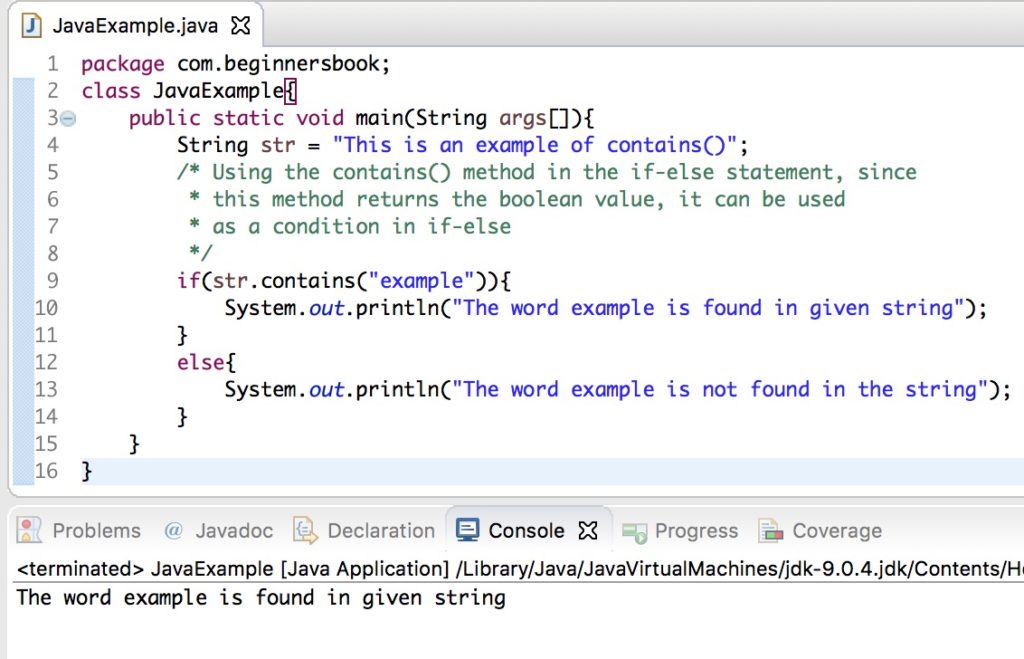Java String contains() method checks whether a particular sequence of characters is part of a given string or not. This method returns true if a specified sequence of characters is present in a given string, otherwise it returns false.
For example:
String str = "Game of Thrones";
//This will print "true" because "Game" is present in the given String
System.out.println(str.contains("Game"));
// This will print "false" because "aGme" is not present, the characters
// must be present in the same sequence as specified in the contains method
System.out.println(str.contains("aGme"));
Syntax of contains() method
public boolean contains(CharSequence str)
The return type is boolean which means this method returns true or false. When the character sequence found in the given string then this method returns true else it returns false.
If the CharSequence is null then this method throws NullPointerException. For example: calling this method like this would throw NullPointerException.
str.contains(null);
Java String contains() method Examples
Let’s see some examples to understand how to use this method in various scenarios:
1. Simple Example to Demonstrate case sensitive nature of contains()
The second print statement displayed false because the contains() method is case sensitive. You can also use the contains() method for case insensitive check, I have covered this at the end of this tutorial.
class Example{
public static void main(String args[]){
String str = "Do you like watching Game of Thrones";
System.out.println(str.contains("like"));
/* this will print false as the contains() method is
* case sensitive. Here we have mentioned letter "l"
* in upper case and in the actual string we have this
* letter in the lower case.
*/
System.out.println(str.contains("Like"));
System.out.println(str.contains("Game"));
System.out.println(str.contains("Game of"));
}
}
Output:
true false true true
2. Using the method in if-else statement
As we know that the contains() method returns a boolean value, we can use this method as a condition in if-else statement.
class JavaExample{
public static void main(String args[]){
String str = "This is an example of contains()";
/* Using the contains() method in the if-else statement, since
* this method returns the boolean value, it can be used
* as a condition in if-else
*/
if(str.contains("example")){
System.out.println("The word example is found in given string");
}
else{
System.out.println("The word example is not found in the string");
}
}
}
Output:

3. How to use String contains() method for case insensitive check
In the above example, we have seen that the contains() method is case sensitive, however with a little trick, you can use this method for case insensitive checks. Lets take an example to understand this:
Here, we are using the toLowerCase() method to convert both the strings to lowercase so that we can perform case insensitive check using contains() method. We can also use toUpperCase() method for this same purpose as shown in the example below.
class Example{
public static void main(String args[]){
String str = "Just a Simple STRING";
String str2 = "string";
//Converting both the strings to lower case for case insensitive checking
System.out.println(str.toLowerCase().contains(str2.toLowerCase()));
//You can also use the upper case method for the same purpose.
System.out.println(str.toUpperCase().contains(str2.toUpperCase()));
}
}
Output:
true true
4. Example with Case Sensitivity and Null Check
In this example, we are handling case sensitivity by converting both string to lowercase before comparison. We are also handling NullPointerException if substring is null.
public class Main {
public static void main(String[] args) {
String str = "Hello, World!";
String subStr = "world";
// Case sensitive check
boolean containsSubStr = str.toLowerCase().contains(subStr.toLowerCase());
System.out.println("Does the string contain 'world' (case insensitive)? " + containsSubStr); // Output: true
// Null check
try {
String nullStr = null;
boolean containsNull = str.contains(nullStr);
System.out.println("This will not be printed.");
} catch (NullPointerException e) {
System.out.println("Cannot check if a string contains null."); // Output: This message
}
}
}
Leave a Reply